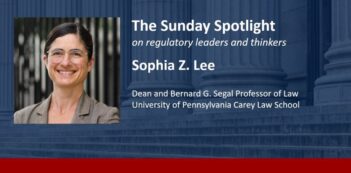
The Regulatory Review highlights the top essays written by our contributors in 2022.
The Regulatory Review is pleased to highlight our top regulatory essays of 2022 authored by a select number of our many expert contributors. These pieces, which qualify for this list based on the number of page views during the past 12 months, are arranged below in alphabetical order by last name of author.
Reflections of an Unapologetic Safety Regulator
October 17, 2022 | Robert S. Adler
Leading U.S. consumer safety regulator reflects on his career and offers lessons for all regulatory professionals.
Increasing Access to Credit in Communities of Color
May 31, 2022 | Olivia Barrow, Low Income Investment Fund
Updating the Community Reinvestment Act to promote special purpose credit programs could improve equity in credit and lending.
Crisis Pregnancy Centers, State-Funded Harm, and State-Based Solutions
February 14, 2022 | Amal Bass, Women’s Law Project
As the Supreme Court evaluates abortion laws, states should bolster reproductive rights and better regulate CPCs.
Cryptocurrency and the Climate Crisis
May 16, 2022 | Lawrence Baxter, Duke Law School
Proponents of crypto must demonstrate that its value to society exceeds its significant environmental costs.
The SBA Should Change Its Rules on Criminal History
April 12, 2022 | Zachary Best and Stephen Hayes, Relman Colfax
Current small business lending discriminates by barring loans to people with criminal histories.
The Biden Administration’s Rail Regulation Efforts Make Little Sense
May 3, 2022 | Ike Brannon, Jack Kemp Foundation and Michael Gorman, University of Dayton
The Biden Administration should discard a recent proposal to impose reciprocal switching on U.S. railroads.
A Risk-Based Approach to AI Procurement
July 11, 2022 | Ashley Casovan and Var Shankar, Responsible AI Institute.
Organizations should tailor contract requirements for procured AI systems based on levels of risk.
How Can Governments Use AI to Improve Procurement?
June 30, 2022 | Dan Chenok, IBM Center for the Business of Government
By using artificial intelligence, agencies can improve their procurement processes.
Empathy in an Automated State
January 10, 2022 | Cary Coglianese, University of Pennsylvania Law School
Increased use of artificial intelligence in public administration calls for efforts to give government a human touch.
Digital Versus Human Algorithms
April 25, 2022 | Cary Coglianese, University of Pennsylvania Law School and Alicia Lai
In deciding to use artificial intelligence, the key question for administrators is a comparative one.
Did Step Zero Help Doom Chevron?
June 13, 2022 | Cary Coglianese, University of Pennsylvania Law School
One of the Supreme Court’s most significant administrative law precedents may soon be overturned.
Law’s Interaction with Voluntary Codes and Standards
August, 2022 | Cary Coglianese, University of Pennsylvania Law School and Angel Reed
Voluntary codes and standards affect many important aspects of the law and the legal system.
Balancing Public Engagement and Agency Action in a Changing World
March 14, 2022 | Mariano-Florentino Cuéllar, Carnegie Endowment for International Peace
Regulators facing challenges such as climate change must balance obtaining public input with acting effectively.
Pushing Social Media Platforms to Self-Regulate
January 3, 2022 | Michael A. Cusumano, MIT Sloan School of Management; David B. Yoffie, Harvard Business School; Annabelle Gawer, Surrey Business School
Social media companies may increase content oversight if motivated by federal incentives and liabilities.
Analyzing Language to Identify Stakeholders
September 12, 2022 | Fabiana Di Porto, University of Salento
Using artificial intelligence in public consultation processes could enhance participation in rulemaking.
Is ESG Simply the Old CSR Wine in a New Bottle?
March 28, 2022 | Nives Dolšak, University of Washington; Jennifer J. Griffin, Loyola University Chicago; Aseem Prakash, University of Washington
ESG initiatives will provide little social value if firms do not improve conditions that led CSR to fail.
Major Questions and Juristocracy
January 31, 2022 | David M. Driesen, Syracuse University College of Law
In rejecting agency action on the basis of the “major questions doctrine,” judges undermine congressional policies.
The False Promise of “Third-Category” Worker Laws
April 19, 2022 | Veena Dubal, University of California Hastings College of the Law
Proposition 22 and similar laws exacerbate workforce inequalities.
The Misuse of History to Undercut the Modern Regulatory State
February 1, 2022 | Daniel A. Farber, University of California Berkeley Law
Originalist arguments for rewriting administrative law are weaker than they seem.
Fashion, Sustainability, and the New York Fashion Act
February 28, 2022 | Melissa Gamble, Columbia College Chicago
A New York State bill seeks to regulate the fashion industry’s social and environmental impacts.
Rule 50 of the Olympic Charter and Freedom of Expression
March 22, 2022 | Chui Ling Goh, Melbourne Law School
Olympic rules must balance the right to freedom of expression with the neutrality of the games.
Regulatory Reform, Benefit-Cost Analysis, and the Poor
March 8, 2022 | John D. Graham, Indiana University
OIRA should add a benefit-cost analysis focused on protecting the poor when evaluating new agency rules.
A Review of Health Care in the Court
July 18, 2022 | Allison K. Hoffman, University of Pennsylvania Law School
Several U.S. Supreme Court cases from this past term have significant implications for the provision of medical care.
The Hidden Governance in AI
July 7, 2022 | Abigail Z. Jacobs, University of Michigan and Deirdre K. Mulligan, University of California Berkeley
Measurement modeling could further the government’s understanding of AI policymaking tools.
How Agencies Can Better Regulate for Racial Justice
April 18, 2022 | Olatunde C. Johnson, Columbia Law School
The federal government should promote racial equity assessments, equity planning, and audits.
Improving International Regulatory Cooperation
September 6, 2022 | Marianna Karttunen and Alberto Morales, Organization for Economic Cooperation and Development
New OECD recommendation seeks to improve regulatory cooperation across countries.
Public Input in Rulemaking
March 7, 2022 | Sally Katzen, NYU Law
Public comments allow agencies to understand the perspectives of those who regulations are intended to benefit.
Is the Biggest Supreme Court Case This Term About Bacon?
November 14, 2022 | Michael S. Knoll, University of Pennsylvania Law School and Ruth Mason, University of Virginia Law School
In National Pork Council v. Ross, the Court questions whether states can ban products for moral reasons.
Using Insurance to Regulate Food Safety
August 8, 2022 | Timothy D. Lytton, Georgia State University College of Law
Insurance underwriters can help farmers manage the risk of microbial contamination in their fields.
A Major Ruling on Major Questions
July 15, 2022 | Randolph J. May, President of the Free State Foundation
In West Virginia v. EPA, the Supreme Court cements the major questions doctrine and strengthens the separation of powers.
Do Not Blame Us
July 25, 2022 | Thomas O. McGarity and Wendy E. Wagner, University of Texas at Austin School of Law
Court disregards the Clean Air Act’s clear language in applying the major questions doctrine to curb EPA’s climate authority.
Lessons from the Paycheck Protection Program
May 2, 2022 | Susan C. Morse, University of Texas at Austin School of Law
To navigate future crises, policymakers can learn from the flaws of pandemic-era loan distribution.
Walmart Threads the Needle on Separation-of-Powers Remedies
October 3, 2022 | Eli Nachmany
Walmart challenges the constitutionality of the FTC’s power to seek monetary or injunctive relief.
Supreme Illegitimacy
October 10, 2022 | Eric W. Orts, Wharton School of the University of Pennsylvania
A terrible trio of Supreme Court cases from last term illustrates the need for judicial reform, which can occur through several options.
Dismantling Unjust Interest Rates for Debt Collection Judgments
March 30, 2022 | Karuna Patel, Fordham Law School
States should follow New York’s lead in lowering how much interest must be paid on unpaid debt judgments.
Vaccine Mandates and Roads Not Taken
January 24, 2022 | Richard J. Pierce, Jr., George Washington University Law School
Another regulatory approach to mandate vaccines could have withstood judicial scrutiny.
Important Changes at the Intersection of Antitrust and Administrative Law
March 21, 2022| Richard J. Pierce, Jr., George Washington University Law School
Supreme Court changes in administrative law create uncertainty for new antitrust guidance from federal regulators.
Is Chevron Deference Still Alive?
July 14, 2022 | Richard J. Pierce, Jr., George Washington University Law School
Three takeaways follow from the Supreme Court’s recent opinions ignoring Chevron v. NRDC.
Reviving the Law of Networks, Platforms, and Utilities
November 1, 2022 | Morgan Ricks and Ganesh Sitaraman, Vanderbilt Law School; Shelley Welton, University of Pennsylvania Law School; Lev Menand, Columbia Law School
A new casebook reintroduces tools to address critical issues in sectors such as transportation, energy, finance, and technology.
The Regulation of Black Families
April 20, 2022 | Dorothy Roberts, University of Pennsylvania Law School
The United States should replace its current family surveillance system with one that improves children’s welfare.
Priorities and the State of Implicit Bias in Crimmigration
April 13, 2022 | Carrie Rosenbaum, University of California Berkeley School of Law
Written immigration enforcement priorities might promote transparency but still might not address inequities.
Unlocking the Potential Between Blockchain and Antitrust
January 17, 2022 | Thibault Schrepel, VU Amsterdam University
The tech and legal communities should recognize the complementary nature of antitrust law and blockchain.
Alternatives to Data Sharing
February 21, 2022 | Thibault Schrepel, VU Amsterdam University
Data sharing is not always required when firms use information to their advantage.
Toxic Metals in Baby Food Remain Unregulated
September 13, 2022 | Jonathan Sharp, Environmental Litigation Group
Despite delayed government action, manufacturers can do more to reduce toxic metals in baby food.
Antitrust and Law Schools’ Exit from U.S. News Rankings
November 22, 2022 | Theodosia Stavroulaki, Gonzaga University School of Law
As Yale, Harvard, and other law schools withdraw from U.S. News rankings, they can argue it is good for competition.
Court Allows Administration to End “Remain in Mexico”
July 13, 2022 | Shoba Sivaprasad Wadhia, Penn State Law
DHS has discretion to end its policy requiring noncitizens to wait in Mexico pending their immigration proceedings.
No, the Supreme Court Cannot Save Democracy
April 11, 2022 | Daniel E. Walters, Texas A&M University School of Law
The Supreme Court is forcing a deregulatory agenda under the guise of restoring democracy.
A Dangerous, Even if Expected, Opinion on Climate
July 12, 2022 | Shelley Welton, University of Pennsylvania Law School
The Supreme Court casts a shadow across the regulatory state in opinion limiting EPA’s ability to fight climate change.
A Turning Point for Digital Asset Regulation
March 14, 2022 | Kevin Werbach, Wharton School at the University of Pennsylvania
President Biden’s executive order puts forth a competitive and inclusive vision for the future of digital assets.
Another Round of Speculation about Chevron?
September 26, 2022 | Evan Zoldan, University of Toledo College of Law
An upcoming SCOTUS case provides an opening for greater dispute over the power of regulatory agencies.
This page is part of a five-part series, entitled The 2022 Regulatory Year In Review.



